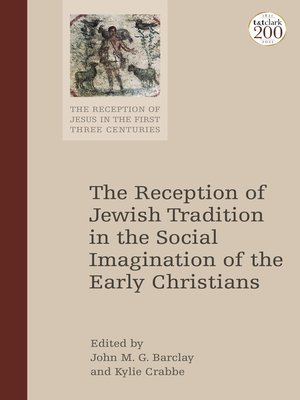The Reception of Jewish Tradition in the Social Imagination of the Early Christians
ebook ∣ The Reception of Jesus in the First Three Centuries
By John M.G. Barclay

Sign up to save your library
With an OverDrive account, you can save your favorite libraries for at-a-glance information about availability. Find out more about OverDrive accounts.
Find this title in Libby, the library reading app by OverDrive.



Search for a digital library with this title
Title found at these libraries:
| Library Name | Distance |
|---|---|
| Loading... |
The contributors to this volume take as their theme the reception of Jewish traditions in early Christianity, and the ways in which the meaning of these traditions changed as they were put to work in new contexts and for new social ends. Special emphasis is placed on the internal variety and malleability of these traditions, which underwent continual processes of change within Judaism, and on reception as an active, strategic, and interested process.
All the essays in this volume seek to bring out how acts of reception contribute to the social formation of early Christianity, in its social imagination (its speech and thought about itself) or in its social practices, or both. This volume challenges static notions of tradition and passive ideas of 'reception', stressing creativity and the significance of 'strong' readings of tradition. It thus complicates standard narratives of 'the parting of the ways' between 'Christianity' and 'Judaism', showing how even claims to continuity were bound to make the same different.
All the essays in this volume seek to bring out how acts of reception contribute to the social formation of early Christianity, in its social imagination (its speech and thought about itself) or in its social practices, or both. This volume challenges static notions of tradition and passive ideas of 'reception', stressing creativity and the significance of 'strong' readings of tradition. It thus complicates standard narratives of 'the parting of the ways' between 'Christianity' and 'Judaism', showing how even claims to continuity were bound to make the same different.







